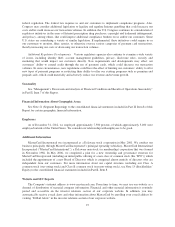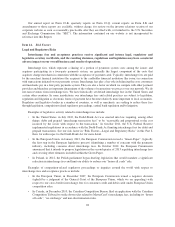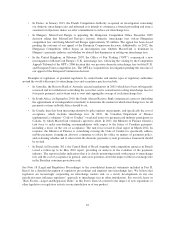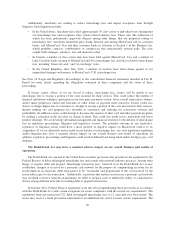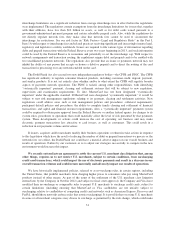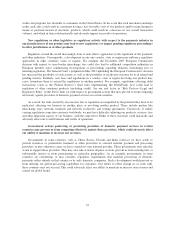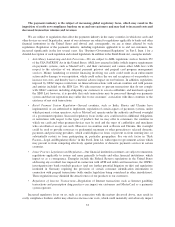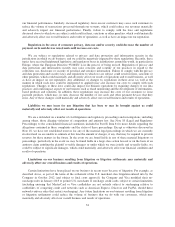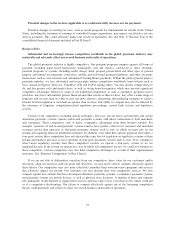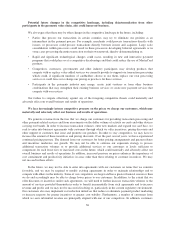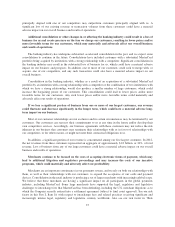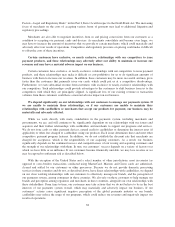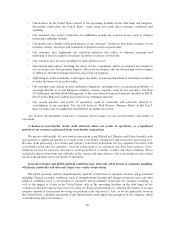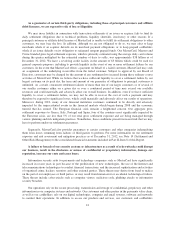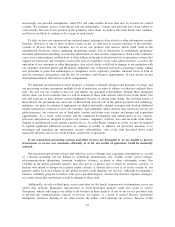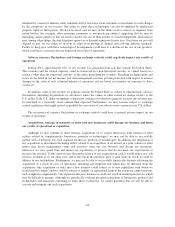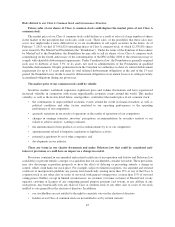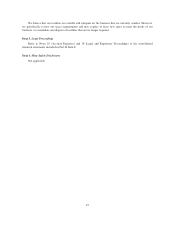MasterCard 2012 Annual Report Download - page 41
Download and view the complete annual report
Please find page 41 of the 2012 MasterCard annual report below. You can navigate through the pages in the report by either clicking on the pages listed below, or by using the keyword search tool below to find specific information within the annual report.principally aligned with one of our competitors may outperform customers principally aligned with us. A
significant loss of our existing revenue or transaction volumes from these customers could have a material
adverse impact on our overall business and results of operations.
Additional consolidation or other changes in or affecting the banking industry could result in a loss of
business for us and create pressure on the fees we charge our customers, resulting in lower prices and/or
more favorable terms for our customers, which may materially and adversely affect our overall business
and results of operations.
The banking industry has undergone substantial, accelerated consolidation in the past, and we expect some
consolidation to continue in the future. Consolidations have included customers with a substantial MasterCard
portfolio being acquired by institutions with a strong relationship with a competitor. Significant consolidation in
the banking industry may result in the substantial loss of business for us, which could have a material adverse
impact on our business and prospects. In addition, one or more of our customers could seek to merge with, or
acquire, one of our competitors, and any such transaction could also have a material adverse impact on our
overall business.
Consolidation in the banking industry, whether as a result of an acquisition of a substantial MasterCard
portfolio by an institution with a strong relationship with a competitor or the combination of two institutions with
which we have a strong relationship, would also produce a smaller number of large customers, which could
increase the bargaining power of our customers. This consolidation could lead to lower prices and/or more
favorable terms for our customers. Any such lower prices and/or more favorable terms could materially and
adversely affect our results of operations.
If we lose a significant portion of business from one or more of our largest customers, our revenue
could fluctuate and decrease significantly in the longer term, which could have a material adverse long-
term impact on our business.
Most of our customer relationships are not exclusive and in certain circumstances may be terminated by our
customers. Our customers can reassess their commitments to us at any time in the future and/or develop their
own competitive services. Accordingly, our business agreements with these customers may not reduce the risk
inherent in our business that customers may terminate their relationships with us in favor of relationships with
our competitors, or for other reasons, or might not meet their contractual obligations to us.
In addition, a significant portion of our revenue is concentrated among our five largest customers. In 2012,
the net revenues from these customers represented an aggregate of approximately $1.8 billion, or 24%, of total
revenue. Loss of business from any of our large customers could have a material adverse impact on our overall
business and results of operations.
Merchants continue to be focused on the costs of accepting electronic forms of payment, which may
lead to additional litigation and regulatory proceedings and may increase the costs of our incentive
programs, which could materially and adversely affect our profitability.
Merchants are an important constituency in our payments system, and we rely on both our relationships with
them, as well as their relationships with our customers, to expand the acceptance of our cards and payment
devices. Consolidation in the retail industry is producing a set of larger merchants with increasingly global scope.
We believe that these merchants are having a significant impact on all participants in the global payments
industry, including MasterCard. Some large merchants have supported the legal, regulatory and legislative
challenges to interchange fees that MasterCard has been defending, including the U.S. merchant litigations as to
which the Company recently entered into a settlement agreement (subject to final court approval). See our risk
factor in this Part I, Item 1A with respect to interchange fees and related practices receiving significant and
increasingly intense legal, regulatory and legislative scrutiny worldwide. Also see our risk factor in “Risk
37


